牛津译林版(2020)选修第一册Unit 2The Universal Language Working the land Integrated skills 2 课件-(共22张PPT)
文档属性
| 名称 | 牛津译林版(2020)选修第一册Unit 2The Universal Language Working the land Integrated skills 2 课件-(共22张PPT) |

|
|
| 格式 | pptx | ||
| 文件大小 | 501.8KB | ||
| 资源类型 | 教案 | ||
| 版本资源 | 牛津译林版(2019) | ||
| 科目 | 英语 | ||
| 更新时间 | 2023-03-28 19:36:55 | ||
图片预览


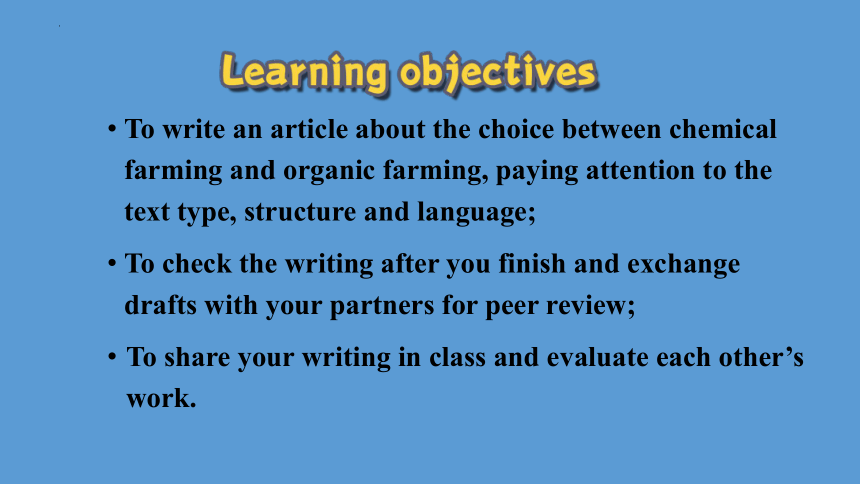
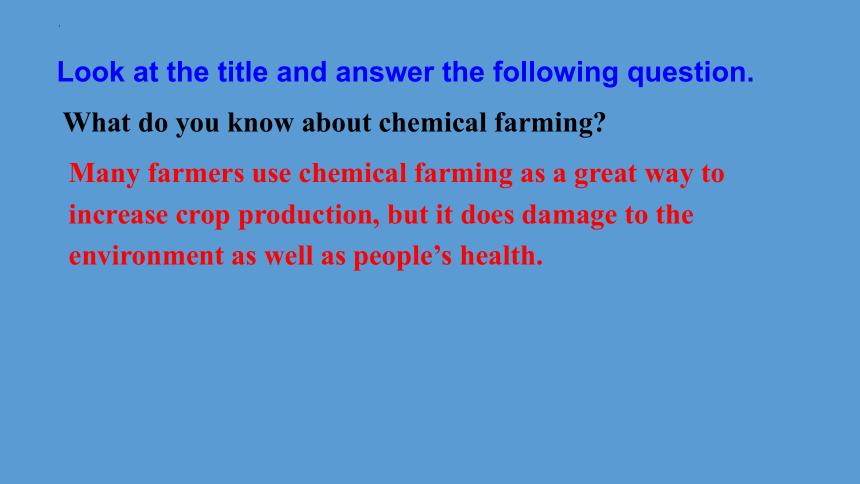
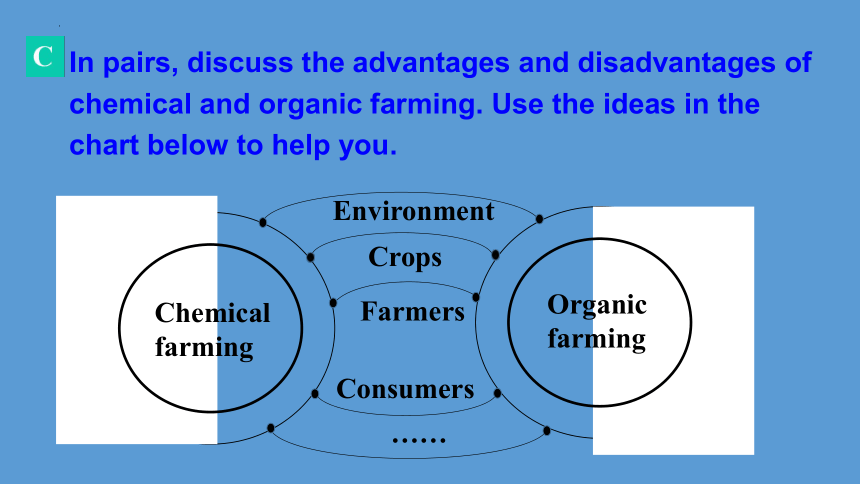
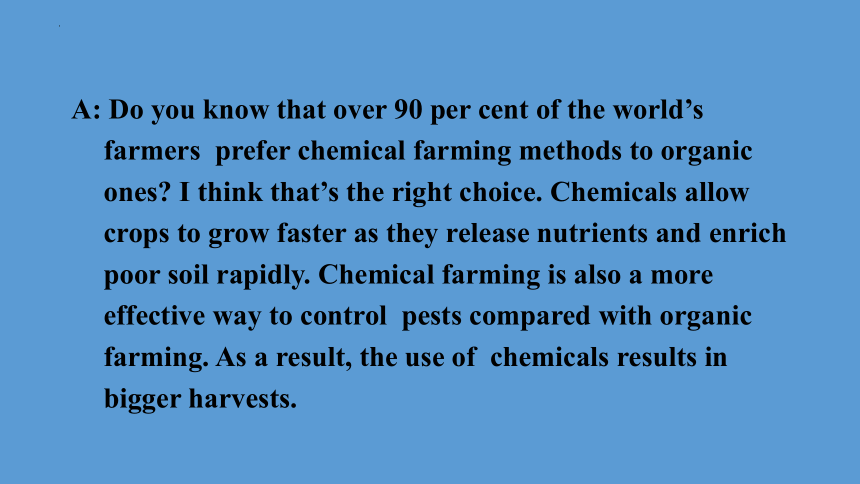
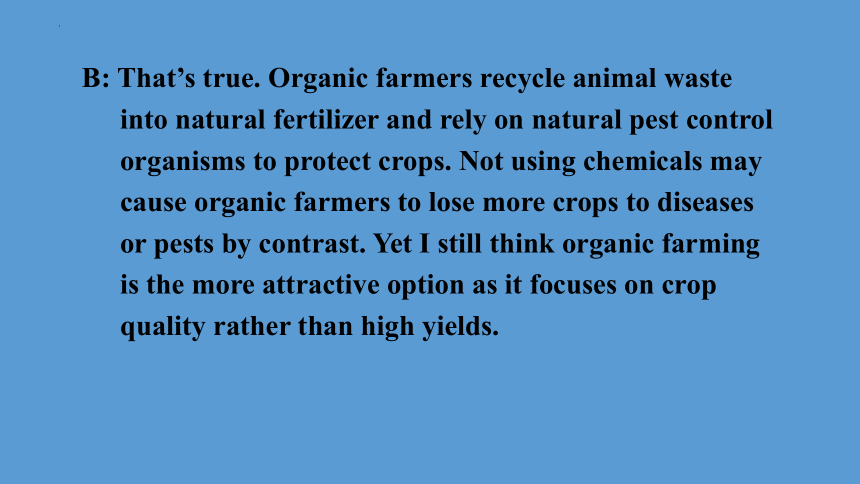
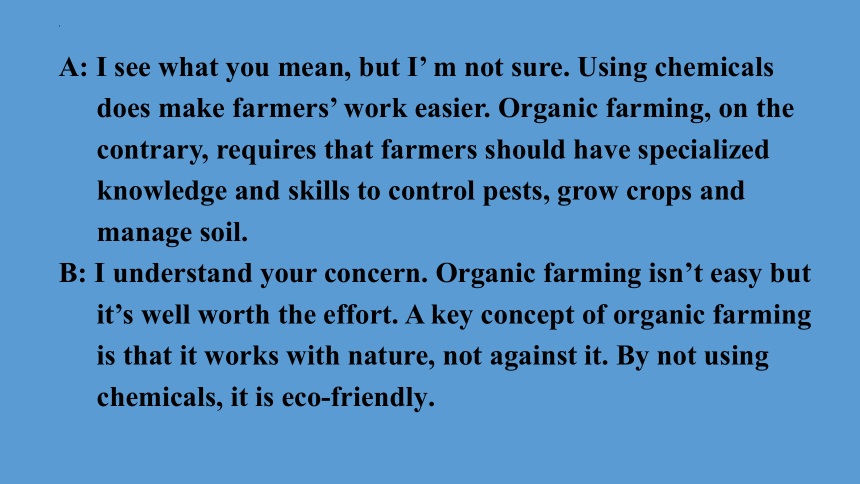
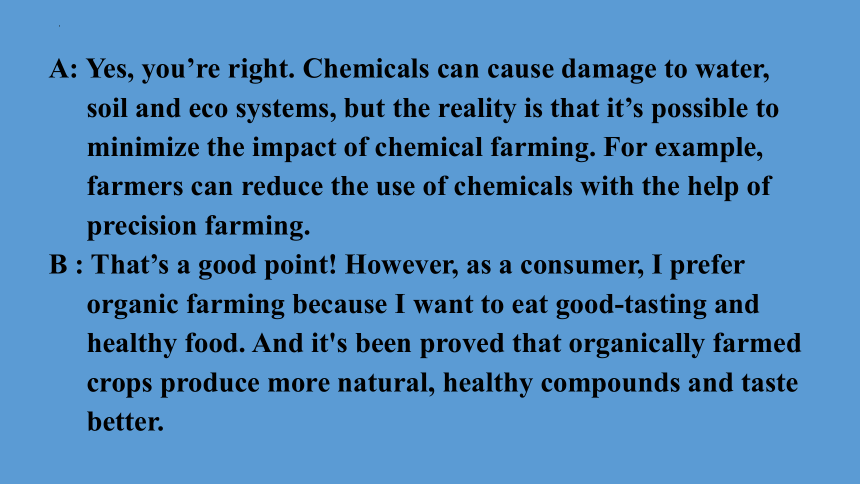
文档简介
(共22张PPT)
UNIT 2
Working the land
To write an article about the choice between chemical farming and organic farming, paying attention to the text type, structure and language;
To check the writing after you finish and exchange drafts with your partners for peer review;
To share your writing in class and evaluate each other’s work.
Look at the title and answer the following question.
What do you know about chemical farming
Many farmers use chemical farming as a great way to increase crop production, but it does damage to the environment as well as people’s health.
In pairs, discuss the advantages and disadvantages of chemical and organic farming. Use the ideas in the chart below to help you.
Environment
Crops
Farmers
Consumers
……
Chemical
farming
Organic
farming
A: Do you know that over 90 per cent of the world’s farmers prefer chemical farming methods to organic ones I think that’s the right choice. Chemicals allow crops to grow faster as they release nutrients and enrich poor soil rapidly. Chemical farming is also a more effective way to control pests compared with organic farming. As a result, the use of chemicals results in bigger harvests.
B: That’s true. Organic farmers recycle animal waste into natural fertilizer and rely on natural pest control organisms to protect crops. Not using chemicals may cause organic farmers to lose more crops to diseases or pests by contrast. Yet I still think organic farming is the more attractive option as it focuses on crop quality rather than high yields.
A: I see what you mean, but I’ m not sure. Using chemicals does make farmers’ work easier. Organic farming, on the contrary, requires that farmers should have specialized knowledge and skills to control pests, grow crops and manage soil.
B: I understand your concern. Organic farming isn’t easy but it’s well worth the effort. A key concept of organic farming is that it works with nature, not against it. By not using chemicals, it is eco-friendly.
A: Yes, you’re right. Chemicals can cause damage to water, soil and eco systems, but the reality is that it’s possible to minimize the impact of chemical farming. For example, farmers can reduce the use of chemicals with the help of precision farming.
B : That’s a good point! However, as a consumer, I prefer organic farming because I want to eat good-tasting and healthy food. And it's been proved that organically farmed crops produce more natural, healthy compounds and taste better.
A: That makes sense. However, consumers have to pay more for organic food. Considering the problem of world hunger and the urgent need for more food, I would still choose chemical farming.
B: Well, organic farming is my first choice because its long-term benefits out weigh its short-term challenges.
D
Write an article for the Farm to School Week about your choice between chemical and organic farming methods. Use your ideas from part C and the information in parts A and B to help you. Check and improve your writing after you finish it.
Title:___________________
__________________________________________________________________________
__________________________________________________________________________
__________________________________________________________________________
__________________________________________________________________________
__________________________________________________________________________
__________________________________________________________________________
__________________________________________________________________________
_____________________________________
Your choice
Reasons for the choice
Conclusion
Please check your writings and exchange drafts with your partners for peer review by asking the following questions.
1. Do you cover all the key points
2. Do you focus on the contents of your writing and its language quality
3. Do you pay attention to the following aspects: punctuation, spelling, grammar, choice of words, style and your handwriting
Please review your drafts in pairs by answering the following questions.
1. What does your partner think of your writing
2. How can you polish up your writing
Please make presentations to the class and evaluate
the writings you appreciate.
2. Please help each other to improve the shared drafts
guided by a sample essay.
Chemical farming: the farmer’s helping hand
With the rapidly growing global population, more food needs to be produced. Chemical farming can certainly help achieve this goal and it is the better choice for farmers. In fact, over 90 per cent of the world’s farmers choose chemical farming methods over organic ones, demonstrating the popularity of chemical farming.
Chemical farming has many advantages. It helps farmers produce higher yields more quickly than organic farming. As chemical fertilizers are fast-acting, poor soil rapidly becomes enriched with nutrients, allowing plants to grow faster. In addition, chemical pesticides and herbicides ensure that crops stay healthy and protected from pests and diseases. In contrast, by not using chemicals, organic farmers may lose more crops to diseases and pests.
There is no denying that chemical farming is not perfect. Chemicals do cause damage to the environment and also affect human health. However, farmers can make every effort to minimize the damage they do by cutting down on the use of chemicals. For instance, the advent of precision farming makes it possible to have more accurate measurements of chemicals, greatly reducing the amounts of unnecessary chemicals.
In conclusion, I support chemicals as an option in farming because they are a useful tool for farmers to use. By producing more food, chemical farming can also help solve the problem of world hunger.
Organic farming: farming the way nature intends
In recent years, there has been a growing focus on the environment and human health, so it has increased an awareness of how our food is produced. Though chemical farming is used by over 90 per cent of the world’s farmers, the wide range of damage it has caused to the environment and human health makes it a bad choice. Organic farming, on the other hand, aims to improve food quality, reduce farming’s environmental impact and promote consumers’ health. It is therefore the option that farmers should choose.
The advantages of organic farming are obvious. Evidence shows that organically grown crops produce natural compounds which improve their flavour. In addition, by avoiding the use of chemicals, organic farming produces food that is healthier for consumers. Organic farming is also more eco-friendly by working with nature, not against it. For instance, farmers recycle animal waste into natural fertilizer, so soil microorganisms help add nutrients to the soil. Consequently, the environment is protected from chemical pollution, ecosystems stay unaffected and consumers benefit from eating chemical-free produce. In contrast, chemical farming can cause damage to water, soil and ecosystems.
It is true that organic farming is not easy and presents some challenges to farmers, like producing lower yields. On the other hand, consumers may need to pay more for organically grown food. But over the long term, the benefits of organic farming exceed those of chemical farming.
To conclude, organic farming may not produce large harvests or quick and reliable plant growth like chemical farming does, but it does provide options with considerable benefits for people and the planet. I believe it is in our best interests to choose organic farming over chemical farming.
Polish up your writing and read more articles written by your classmates.
UNIT 2
Working the land
To write an article about the choice between chemical farming and organic farming, paying attention to the text type, structure and language;
To check the writing after you finish and exchange drafts with your partners for peer review;
To share your writing in class and evaluate each other’s work.
Look at the title and answer the following question.
What do you know about chemical farming
Many farmers use chemical farming as a great way to increase crop production, but it does damage to the environment as well as people’s health.
In pairs, discuss the advantages and disadvantages of chemical and organic farming. Use the ideas in the chart below to help you.
Environment
Crops
Farmers
Consumers
……
Chemical
farming
Organic
farming
A: Do you know that over 90 per cent of the world’s farmers prefer chemical farming methods to organic ones I think that’s the right choice. Chemicals allow crops to grow faster as they release nutrients and enrich poor soil rapidly. Chemical farming is also a more effective way to control pests compared with organic farming. As a result, the use of chemicals results in bigger harvests.
B: That’s true. Organic farmers recycle animal waste into natural fertilizer and rely on natural pest control organisms to protect crops. Not using chemicals may cause organic farmers to lose more crops to diseases or pests by contrast. Yet I still think organic farming is the more attractive option as it focuses on crop quality rather than high yields.
A: I see what you mean, but I’ m not sure. Using chemicals does make farmers’ work easier. Organic farming, on the contrary, requires that farmers should have specialized knowledge and skills to control pests, grow crops and manage soil.
B: I understand your concern. Organic farming isn’t easy but it’s well worth the effort. A key concept of organic farming is that it works with nature, not against it. By not using chemicals, it is eco-friendly.
A: Yes, you’re right. Chemicals can cause damage to water, soil and eco systems, but the reality is that it’s possible to minimize the impact of chemical farming. For example, farmers can reduce the use of chemicals with the help of precision farming.
B : That’s a good point! However, as a consumer, I prefer organic farming because I want to eat good-tasting and healthy food. And it's been proved that organically farmed crops produce more natural, healthy compounds and taste better.
A: That makes sense. However, consumers have to pay more for organic food. Considering the problem of world hunger and the urgent need for more food, I would still choose chemical farming.
B: Well, organic farming is my first choice because its long-term benefits out weigh its short-term challenges.
D
Write an article for the Farm to School Week about your choice between chemical and organic farming methods. Use your ideas from part C and the information in parts A and B to help you. Check and improve your writing after you finish it.
Title:___________________
__________________________________________________________________________
__________________________________________________________________________
__________________________________________________________________________
__________________________________________________________________________
__________________________________________________________________________
__________________________________________________________________________
__________________________________________________________________________
_____________________________________
Your choice
Reasons for the choice
Conclusion
Please check your writings and exchange drafts with your partners for peer review by asking the following questions.
1. Do you cover all the key points
2. Do you focus on the contents of your writing and its language quality
3. Do you pay attention to the following aspects: punctuation, spelling, grammar, choice of words, style and your handwriting
Please review your drafts in pairs by answering the following questions.
1. What does your partner think of your writing
2. How can you polish up your writing
Please make presentations to the class and evaluate
the writings you appreciate.
2. Please help each other to improve the shared drafts
guided by a sample essay.
Chemical farming: the farmer’s helping hand
With the rapidly growing global population, more food needs to be produced. Chemical farming can certainly help achieve this goal and it is the better choice for farmers. In fact, over 90 per cent of the world’s farmers choose chemical farming methods over organic ones, demonstrating the popularity of chemical farming.
Chemical farming has many advantages. It helps farmers produce higher yields more quickly than organic farming. As chemical fertilizers are fast-acting, poor soil rapidly becomes enriched with nutrients, allowing plants to grow faster. In addition, chemical pesticides and herbicides ensure that crops stay healthy and protected from pests and diseases. In contrast, by not using chemicals, organic farmers may lose more crops to diseases and pests.
There is no denying that chemical farming is not perfect. Chemicals do cause damage to the environment and also affect human health. However, farmers can make every effort to minimize the damage they do by cutting down on the use of chemicals. For instance, the advent of precision farming makes it possible to have more accurate measurements of chemicals, greatly reducing the amounts of unnecessary chemicals.
In conclusion, I support chemicals as an option in farming because they are a useful tool for farmers to use. By producing more food, chemical farming can also help solve the problem of world hunger.
Organic farming: farming the way nature intends
In recent years, there has been a growing focus on the environment and human health, so it has increased an awareness of how our food is produced. Though chemical farming is used by over 90 per cent of the world’s farmers, the wide range of damage it has caused to the environment and human health makes it a bad choice. Organic farming, on the other hand, aims to improve food quality, reduce farming’s environmental impact and promote consumers’ health. It is therefore the option that farmers should choose.
The advantages of organic farming are obvious. Evidence shows that organically grown crops produce natural compounds which improve their flavour. In addition, by avoiding the use of chemicals, organic farming produces food that is healthier for consumers. Organic farming is also more eco-friendly by working with nature, not against it. For instance, farmers recycle animal waste into natural fertilizer, so soil microorganisms help add nutrients to the soil. Consequently, the environment is protected from chemical pollution, ecosystems stay unaffected and consumers benefit from eating chemical-free produce. In contrast, chemical farming can cause damage to water, soil and ecosystems.
It is true that organic farming is not easy and presents some challenges to farmers, like producing lower yields. On the other hand, consumers may need to pay more for organically grown food. But over the long term, the benefits of organic farming exceed those of chemical farming.
To conclude, organic farming may not produce large harvests or quick and reliable plant growth like chemical farming does, but it does provide options with considerable benefits for people and the planet. I believe it is in our best interests to choose organic farming over chemical farming.
Polish up your writing and read more articles written by your classmates.
同课章节目录
- Unit 1 Food matters
- Welcome to the unit
- Reading
- Grammar and usage
- Integrated skills
- Extended reading
- Project
- Unit 2 The Universal Language
- Welcome to the unit
- Reading
- Grammar and usage
- Integrated skills
- Extended reading
- Project
- Unit 3 The art of painting
- Welcome to the unit
- Reading
- Grammar and usage
- Integrated skills
- Extended reading
- Project
- Unit 4 Exploring poetry
- Welcome to the unit
- Reading
- Grammar and usage
- Integrated skills
- Extended reading
- Project
